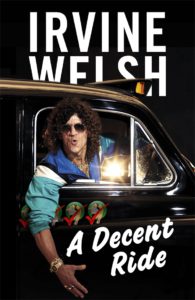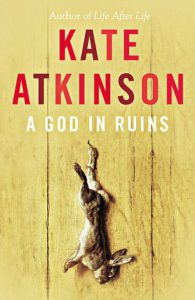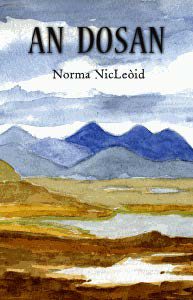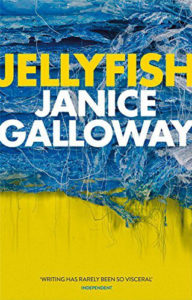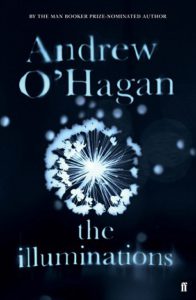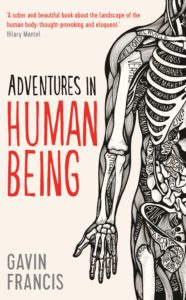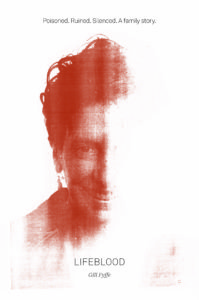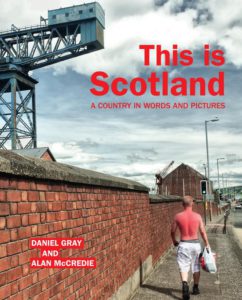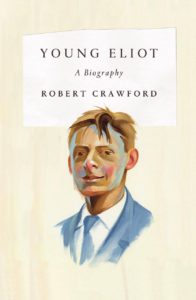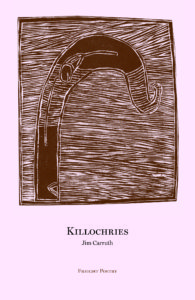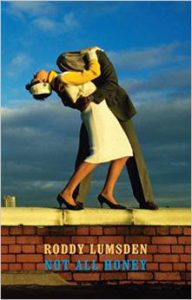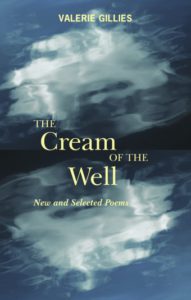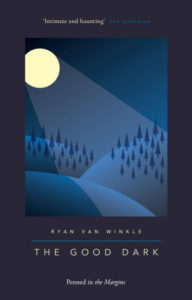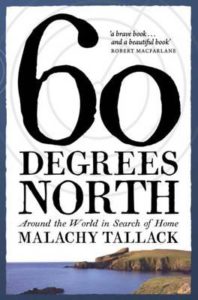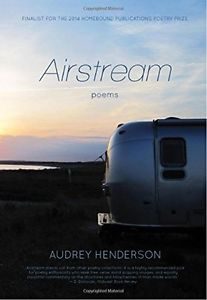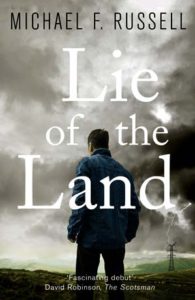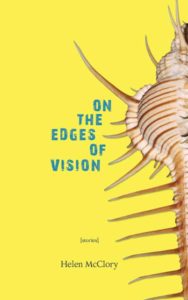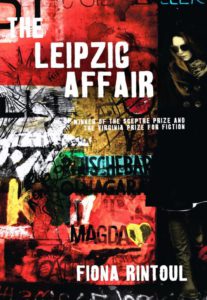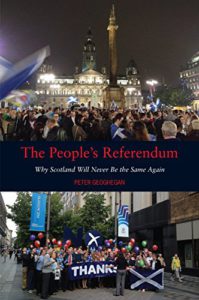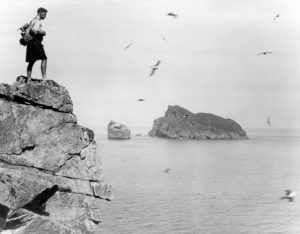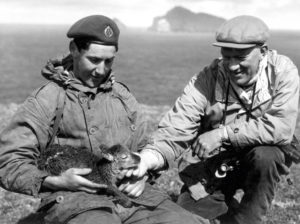Continuing the long tradition of the Saltire Society Literary Awards engaging with the many different kinds of literature Scotland has to offer, for the first time this year we are expanding one of our awards into two categories for Fiction and Non-Fiction books. The Fiction Book of the Year Award celebrates the best fiction from, and about, Scotland.
A Decent Ride
by Irvine Welsh
Published by Jonathan Cape
The title says it all,but the book must be read to bring out the joyful impudence of the joke. Welsh pushes the boundaries once more in an irreverent plunge into an Edinburgh not covered in the guide-books. An up-to-date and hugely entertaining satire — sometimes grotesque, but full of humanity.
What the shadow panel said:
The humour of Welsh’s most recent novel was praised and the local Edinburgh setting appreciated as being typical Welsh.
A God in Ruins
by Kate Atkinson
Published by Transworld Publishers
A fine historical novel about Bomber Command’s war — but also a moving meditation about life and death, about time and aging, and about the novelist’s art itself. Seriousness is counterpointed by Atkinson’s characteristic wit, and by a sense of the author’s own commitment to her subject-matter.
What the shadow panel said:
The shadow panel appreciated the unquestionable quality and beauty of the writing in Atkinson’s latest novel. Her weaving of the stories of several characters over different time periods was noted as exemplifying Atkinson’s unique skills.
An Dosan
by Norma McLeod
Published by Acair Books
Norma MacLeod’s An Dosan cleverly combines two narratives within one novel. The novel, which is lucidly and elegantly written, is also experimental within the canon of Gaelic literature in its use of the novel within a novel structure.
What the shadow panel said:
The sole Gaelic reader on the shadow panel understood An Dosan to be the first of its kind in Gaelic literature thematically and found it to be an interesting commentary on authorship. He found it to effectively draw on Gaelic culture and be of considerable merit.
Jellyfish
by Janice Galloway
Published by Freight Books
What the panel said:
A short story collection with incisive studies of human interaction in a wide variety of situations, sparely written, startlingly original and unexpected. Sentences start, go unexpectedly, sometimes (like human speech) don’t finish. A challenging and very satisfying read.
What the shadow panel said:
The strength of these short stories greatly impressed the panel though different stories resonated with different members. Where some preferred the shorter, erotically charged tales others appreciated Galloway’s bravely tackled tales of darkness in the every day.
The Book of Strange New Things
by Michel Faber
Published by Canongate Books
Startlingly original, compounded of several genres (and a skilful use of science fiction), searchingly discussing human relationships under extreme stress and looking beyond human relationships. A completely original and very readable book.
What the shadow panel said:
This was a panel favourite for its accessible use of sci-fi and thrilling vision. The writing was found to be beautiful and the story gripping. The panel was impressed and moved by this title. Although one of the longest novels on the list, it was considered to be a real page turner.
The Illuminations
by Andrew O’Hagan
Published by Faber & Faber
Parallels stories which seem too diverse for one novel: an old woman’s final failing and loss of independence, and a young soldier’s bitter experience of the war in Afghanistan. O’Hagan’s sensitive and thoughtful novel unites them in a gently hopeful resolution.
What the shadow panel said:
Another panel favourite, The Illuminations was found to be a quick read but a memorable and powerful one. The thematic parallels of an elderly creative mind lost to dementia and her grandson traumatized by war were highly praised as heart-breakingly effective. A beautiful and emotionally-charged gem.
Stevie Marsden, PhD Researcher and Literary Awards Administrative Assistant at the Saltire Society:
This is the first year the Saltire Society has instituted a ‘shadow judging panel’ scheme for four of their literary award categories: Fiction, First Book, Non Fiction and Poetry. The purpose of the shadow judging panels was to offer young publishers, students and booksellers the opportunity to read the shortlists for these four categories and come together to discuss and judge the books. Through a fantastic partnership with the Society for Young Publishers, Scotland, this scheme has been hugely successful, with all of the participants commenting about how exciting this unique opportunity to engage with Scottish literature in this way was. The Saltire Society has been delighted that so many young publishers, booksellers and future publishers have had the opportunity to experience what it feels like to be in the judges chair!
The judging panel for the First Book of the Year Shortlist is:
Professor Ian Campbell – Dr Ann Matheson – Hannah McGill – Joyce McMillan – Jenny Niven – Dr David Robb – David Robinson – Professor Mark Wringe
The shadow panel for the First Book of the Year Shortlist is:
Keira Brown (Chair)- Laura Jones – Laura Borrelli – Sophie Pinkoski – Stephanie Cargill-Greer – Liam Alastair Crouse (Gaelic advisor)
There has always been a great tradition of non-fiction writing in Scotland, and it is an area of Scottish literature that continues to thrive. It is for such reasons that, in 2015, the Saltire Society expanded its series of awards to include one for the best non-fiction books by Scottish authors or about a Scottish theme or issue.
Adventures in Being Human
by Gavin Francis
Published by Profile Books
A book which takes the reader through surgery, blood, dissection and much squeamish tissue turns out to be totally approachable and wonderfully instructive. Francis offers a chance to appreciate as never before the miracle of the human body we inhabit. An Edinburgh GP, he spends his days keeping the human being ticking over.
What the shadow panel said:
Gavin Francis’ book opened up a new world of medical narrative to most of the panel. It is a fascinating read that we agreed would appeal to a wide audience. We particularly like this new way of measuring a book – rather than being at chapter 9 or 10 we found ourselves instead at the Abdomen or Pelvis.
Lifeblood
by Gill Fyffe
Published by Freight Books
This is a brave book, dominated by questions of blood after an accidental infusion of tainted blood. The book never offers facile comfort: it confronts human error, human bravery and human incompetence. Personal courage and family support offer life from day to day, but the taint in the blood is always there.
What the shadow panel said:
An important and timely memoir, Lifeblood tells one woman’s story of the devastating effect of failures by the NHS to screen donated blood for Hepatitis C. The book has a wonderful literary feel to it that helped it avoid a more typical ‘misery memoir’ vibe. It was popular with the panel as it informed the reader on these terrible events but also showed the emotional and personal impact it had on Gill Fyffe’s life.
This is Scotland
by Daniel Gray and Alan McCredie
Published by Luath Press
To describe this as a book of photographs of selected Scottish places, and short essays on these places, does not begin to do justice to the quirky originality of this book. The unexpected areas to draw out in the chosen places and the deliberate banality of some of the images counter the too-easy coffee table visions of Scotland.
What the shadow panel said:
This Is Scotland illustrates an interesting mix of random Scottish communities. Unusually for a book of this type it focuses on the urban face of Scotland over the rolling landscapes. It was nice to see a different approach taken with the aim to avoid the more typical glimpse of Scotland so often on the shelves.
Young Eliot
by Robert Crawford
Published by Jonathan Cape
Crawford meticulously reconstructs from a wealth of research the young Eliot as he emerges from a rather unfamiliar USA background into early manhood and the tumultuous years which produced his great later poetry. The second volume will be something to look forward to, completing an Eliot we have not had access to so far.
What the shadow panel said:
While somewhat intimidating at first glance, Young Eliot is a tremendously well researched biography and offers new insight into the early life of this influential writer. Probably most suitable for the Eliot super-fan and dedicated scholars it was nevertheless very enjoyable to get to know young Tom.
Stevie Marsden, PhD Researcher and Literary Awards Administrative Assistant at the Saltire Society:
This is the first year the Saltire Society has instituted a ‘shadow judging panel’ scheme for four of their literary award categories: Fiction, First Book, Non Fiction and Poetry. The purpose of the shadow judging panels was to offer young publishers, students and booksellers the opportunity to read the shortlists for these four categories and come together to discuss and judge the books. Through a fantastic partnership with the Society for Young Publishers, Scotland, this scheme has been hugely successful, with all of the participants commenting about how exciting this unique opportunity to engage with Scottish literature in this way was. The Saltire Society has been delighted that so many young publishers, booksellers and future publishers have had the opportunity to experience what it feels like to be in the judges chair!
The judging panel for the Non-Fiction Book of the Year Shortlist is:
Professor Ian Campbell – Dr Ann Matheson – Hannah McGill – Joyce McMillan – Jenny Niven – Dr David Robb – David Robinson – Professor Mark Wringe
The shadow panel for the Non-Fiction Book of the Year Shortlist is:
Catriona Cox (Chair) – Fiona Wesley – Isobel Urwin – Julia Crawford – Megan Reid – Silje Graffer
First awarded in 2014, the Poetry Book of the Year Award highlights collections of new poetry and recognises the significant contribution poetry makes to Scottish culture, reflecting a great Scottish literary tradition that is still thriving in the 21st century.
Killochries
by Jim Carruth
Published by Freight Books
The beautiful, hard, spare lines perform the work of a much longer novel. A young man broken by drink and drugs spends a remedial year with an unyielding old relative on a bleak country farm. Carruth bravely shows that nature, poetry and belief can combine to make life better, while avoiding the pretense that all will be well.
Not All Honey
by Roddy Lumsden
Published by Bloodaxe Books
Not All Honey may not be all sweetness but it’s all a delight to consume. Lumsden typically is tricksy and evasive, juggling, acrobatic. His professional portmanteau full of linguistic surprises. Yet, he has reached a kind of Dantean point in his poetic life which makes him suddenly offer devastating clarities that justify the fireworks.
The Cream of the Well
by Valerie Gillies
Published by Luath Press
This book contains a lifetime of observation, capturing the essence of the poet’s experiences in beautifully crafted poems whose form often follows the rise and fall of landscapes and birdsong. The new poems migrate from the history and shapes of the Scottish terrain she loves to the swamps and woods of America, finding delights and echoes across the Atlantic.
The Good Dark
by Ryan van Winkle
Published by Penned in the Margins
Van Winkle works with the language of love and love lost till it is scarcely recoverable but which still nourishes the lover’s past and present. His range is remarkable: everything invokes everything else, the tactile calls in the intellectual, one poem calls in every other poem, mundane tasks call in whole physical and emotional worlds.
The judging panel for the First Book of the Year Shortlist is:
Dr Robyn Marsack – Dorothy McMillan – Professor Rory Watson
Celebrating emerging talent and fresh ideas, the First Book of the Year Award is dedicated to first-time authors who have not previously been published, and can be awarded to both fiction or non-fiction books.
60 Degrees North
by Malachy Tallack
Published by Polygon
Essays suggested by that line on the atlas – 60 degrees North – and the countries that line passes through, bound by the encounters with cold, distance, bleakness and human survival against challenging conditions. The author’s quirky interests and determination against difficult conditions make for a rewarding travel account.
What the shadow panel said:
The concept of travelling the 60th parallel is interesting, and Malachy is great at giving each destination its own identity. Every passing character has context, and while 60 Degrees North is a travel book, it reads like a well-written novel. It reaches out to anyone who has ever felt uncertainty about where home really is.
Airstream
by Audrey Henderson
Published by Homebound Publications
Airstream recounts the poet’s travels and passing encounters, snatches of conversation and memory, all made luminous and meaningful in a style of informally oblique personal statement. Henderson has a genuinely engaging voice —deceptively inconsequential in delivery— revealing a perceptive and witty sensibility at work.
What the shadow panel said:
Airstream feels like a story, taking the reader on a journey through poetry. When the flow between them was just right, the collection could sweep the reader away. It brought places like the National Library to life with its own personality, and hooked us with many moments of truly passionate writing.
Lie of the Land
by Michael F. Russell
Published by Polygon
A bleak and dystopian vision of a Scotland where an apocalypse (never closely defined) has all but destroyed the familiar, and where the survivors are hemmed in and controlled by a never seen but always powerful authority. The narrator is a survivor, desperate to make contact with a past all but brutally erased. It is terribly believable.
What the shadow panel said:
This had an exciting premise and 1984 vibes in a not-too-distant future Scotland. Although it was a dystopian book the socio-political issues surrounding this were never really explored. The reason behind everything, or even the potential implications of it, wasn’t dealt with. Lie of the Land promised a lot from the beginning that was never really seen.
On the Edges of Vision
by Helen McClory
Published by Queen’s Ferry Press
These are dark stories about the limits of the conscious and the darkness within. About a world where reality flickers in and out of focus disturbingly. The familiar is even more disturbing than the unfamiliar. These are stories that draw you back to re-read, but they continue to squirm out of final reach.
What the shadow panel said:
This is creepy and made us feel uncomfortable, but in an enjoyable way. Despite the mass of stories they all flow together, with a Pan’s Labyrinth/Coraline vibe to much of it. Even in the shortest stories, the characters are well-formed, and unlike anything we’d read. Ambitious and engaging.
The Liepzig Affair
by Fiona Rintoul
Published by Aurora Metro Books, Ltd
A substantial and ambitious addition to the world of the Cold War spy thriller: a Scottish postgraduate student becomes involved with East German dissidents. A first book of immense confidence, its plot and atmosphere reveal a fully-fledged master of the genre.
What the shadow panel said:
The structure of first person and second person alternating narratives and times (one in the present, one looking back) is what many on the panel liked, and others found difficult. Either way, we felt the characters were so well developed and believable in this book that it was the most impressive, in that, sense for reality.
The People’s Referendum
by Peter Geogheghan
Published by Luath Press
History in the making, as experienced by the people of Scotland. Peter Geogheghan recorded the feelings and attitudes, the hopes and fears, of a varied cross-section of Scottish communities and cultures as the day of national decision, in September 2014, approached.
What the shadow panel said:
Geoghegan made a real attempt to remain balanced on a topic that’s often reported with bias, tying everything back to Scotland’s referendum. Other places and people were given their moment, but the language didn’t always match the topic at hand. It was, however, easy to read even for those not into politics.
Stevie Marsden, PhD Researcher and Literary Awards Administrative Assistant at the Saltire Society:
This is the first year the Saltire Society has instituted a ‘shadow judging panel’ scheme for four of their literary award categories: Fiction, First Book, Non Fiction and Poetry. The purpose of the shadow judging panels was to offer young publishers, students and booksellers the opportunity to read the shortlists for these four categories and come together to discuss and judge the books. Through a fantastic partnership with the Society for Young Publishers, Scotland, this scheme has been hugely successful, with all of the participants commenting about how exciting this unique opportunity to engage with Scottish literature in this way was. The Saltire Society has been delighted that so many young publishers, booksellers and future publishers have had the opportunity to experience what it feels like to be in the judges chair!
The judging panel for the First Book of the Year Shortlist is:
Professor Ian Campbell – Dr Ann Matheson – Hannah McGill – Joyce McMillan – Jenny Niven – Dr David Robb – David Robinson – Professor Mark Wringe
The shadow panel for the First Book of the Year Shortlist is:
Heather McDaid – Charlotte Brady – Justine Bottles – Julia Crawford – Jo O’Brien – Nathaniel Kunitskaya
This island represents an enigmatic and awe-inspiring landscape, a starkly beautiful vision of ‘life on the edge’ which has fascinated everyone from travellers, antiquarians and conservationists to writers, film crews and tourists. And, perhaps as a result, it is one of the most mythologised and misunderstood places on earth. In this new book, archaeologists Angela Gannon and George Geddes turn the popular perception of the archipelago on its head to tell a compelling story of triumph over geographical adversity.
Extract from St. Kilda: The Last and Outmost Island
By Angela Gannon and George Geddes
Published by RCHAMS
The first travellers to St. Kilda must have prepared carefully for their trip across the daunting Atlantic waters, readying their boat, gathering food and fuel, and looking out for good weather conditions.
In the 17th and 18th centuries, the journeys made by the islands’ tacksman were sometimes transformed into battles for survival – in one case during the 1690s, tacksman Alexander MacLeod and his party were blown off course by some 200km to the island of North Rona, where they were forced to spend the winter. For the St. Kildans themselves, careful preparation and good weather were prerequisites for visits to the outlying islands and stacks; even the closest island of Dun presented a significant and treacherous challenge, three men drowning there in 1909. A sense of danger and adventure has been at the heart of visitor and islander experience on St. Kilda since the very beginning. There is little doubt, however, that the evacuation encouraged intrepid scientists, who were more than happy to take on the challenge of living and working on the archipelago without help from anyone else. The 1931 St. Kilda expedition, made up of students from Oxford and Cambridge Universities, and led by ‘one of the foremost scientists of his generation’, David Lack, was a defining example. Visitors after the evacuation also included Robert Atkinson, whose Island Going ranks among the best of all Hebridean travel books. Atkinson and his companion John Ainslie began their island adventure in 1935 with a trip to Handa, driving up in Atkinson’s mother’s car. His interest went beyond ornithology and his photographs, now held at the School of Scottish Studies, form a unique record of St. Kilda’s archaeology and architecture.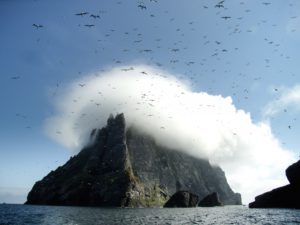
Combining the close study of natural history with a more general description of the islands they visited, Lack and Atkinson paved the way for scientists like John Morton Boyd, for whom St. Kilda would be a rite of passage on his way to becoming the Head of the Nature Conservancy. In 1969, Boyd described how ‘St. Kilda has always been a great event for me. My first visit to the islands in 1952 was my breaking clear of a life where mediocrity provided enough incentive for mediocre achievement. St. Kilda has been my emblem of endeavours and I swear that if I were ever to make recognition of one place as having influenced me more than another, I would not choose Canada or Africa or Britain, but St. Kilda.’ The opportunity to combine adventure with conservation was opened up to a wider community in 1958 when the first of the National Trust for Scotland (NTS) work parties came to the island, a tradition that has continued to this day.
The volunteers, many of whom have returned time and again, were behind the creation of the St. Kilda Club in 1976, and the periodical the St. Kilda Mail, whose first edition described how for ‘those who prefer a challenging, strenuous but very satisfying vacation, a visit to St. Kilda … is surely a must’. In that same issue, the warden, George Wood, wrote of how ‘early in May Dr Mike Harris and Stewart [sic] Murray were engaged on a Puffin study and swinging across the Breaches Buoy with them I enjoyed two wonderful days on Dun’. Stuart Murray first came to St. Kilda in 1974 and in a few short years he had taken every opportunity to explore the archipelago, reaching all of the outer islands and stacks. Stuart’s abilities as a guide and climber were to have a great influence on the survey begun by Mary Harman in 1977. His contribution was no less important to the work of the Royal Commission on the Ancient and Historical Monuments of Scotland (RCAHMS) in the 1980s and 2000s, whether on Dun and Boreray, or on islands like North Rona and the Flannans. Our records of archaeological sites on the stacks still rely on the work of Murray and Harman before 1985. In his comprehensive Natural History of St. Kilda John Love was able to venture that ‘no one today … knows St. Kilda as intimately’. For Stuart, Island Going has become a way of life, where adventure and research are interwoven and inextricably linked.
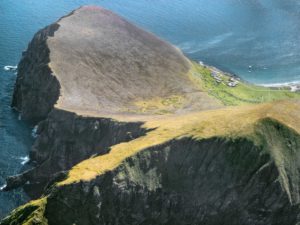 On 26 February 1908, when RCAHMS first met in Edinburgh at 29 St Andrew Square and discussed how they would ‘make an Inventory’, they settled upon a fundamental principle – it was essential that the staff should undertake fieldwork, ‘personally inspecting each monument so as to satisfy your Commissioners as to its true character and condition’. Expeditions to islands became commonplace, beginning with Fidra in the Firth of Forth in 1913 and many of the Outer Hebridean islands between 1914 and 1926. Adventures by boat reached an apex during the survey of Argyll, when the purchase of a dedicated vessel became necessary. In the 1980s, St Kilda presented a unique challenge, through the complications of the survey, and the uncertainties involved in travel to and from the island. Conditions were much more straightforward during the 2007 to 2009 survey, with the facilities offered by the NTS ever-improving.
On 26 February 1908, when RCAHMS first met in Edinburgh at 29 St Andrew Square and discussed how they would ‘make an Inventory’, they settled upon a fundamental principle – it was essential that the staff should undertake fieldwork, ‘personally inspecting each monument so as to satisfy your Commissioners as to its true character and condition’. Expeditions to islands became commonplace, beginning with Fidra in the Firth of Forth in 1913 and many of the Outer Hebridean islands between 1914 and 1926. Adventures by boat reached an apex during the survey of Argyll, when the purchase of a dedicated vessel became necessary. In the 1980s, St Kilda presented a unique challenge, through the complications of the survey, and the uncertainties involved in travel to and from the island. Conditions were much more straightforward during the 2007 to 2009 survey, with the facilities offered by the NTS ever-improving.
Perhaps the only ‘true’ expedition that formed part of this project was the survey of Boreray in 2010. Camping among the Cleitean MacPhaidein, the team endured a storm of terrifying ferocity and witnessed the richest sunsets imaginable while recording in detail the dense archaeological landscape. Three years later, another team set out from Leverburgh at 4am with the express aim of landing on Stac an Àrmainn and recording the incredible evidence of fowling that still survives on its craggy slopes. This was sadly prevented by a tremendous sea swell, which was only appreciated when the boat was within metres of the rocks.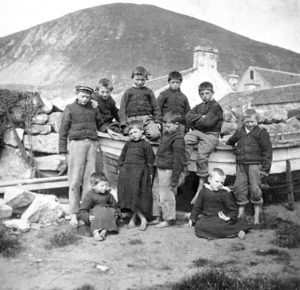
Far more than allowing us to assess the character and condition of St. Kilda’s monuments, our expeditions to the archipelago have provided a remarkable opportunity to understand the nature of living and working on the islands. It has brought into focus what was, for the St. Kildan, an everyday experience. Each day presented different and wildly varying weather conditions, each element of the landscape new challenges in understanding and recording. A few areas also remained out of bounds, whether deemed too dangerous without the help of climbers, or because they are protected as the breeding grounds of important seabird colonies. Some 58 years after its re-occupation, St. Kilda still offers an opportunity for adventure that is unparalleled in the United Kingdom.
During 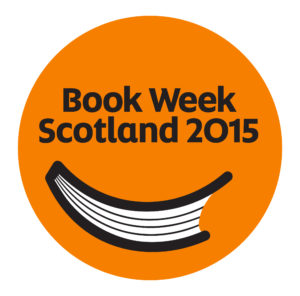 Book Week Scotland, people of all ages and walks of life come together in libraries, schools, community venues and workplaces to share and enjoy books and reading. They are joined in this celebration by Scotland’s authors, poets, playwrights, storytellers and illustrators to bring a packed programme of events and projects to life.
Book Week Scotland, people of all ages and walks of life come together in libraries, schools, community venues and workplaces to share and enjoy books and reading. They are joined in this celebration by Scotland’s authors, poets, playwrights, storytellers and illustrators to bring a packed programme of events and projects to life.
Book Week Scotland is run by the The Scottish Book Trust, and a full programme of events can be found on their website.
To mark the week at Books from Scotland, we’re celebrating the rich tradition of publishing, authorship and reading which has grown up from these shores. We’ve brought this tradition together with the national Year of Food and Drink, to give you HOMEGROWN, a collection of stories a nd recipes from Scottish authors and publishers.
nd recipes from Scottish authors and publishers.
Book Week Scotland 2015 runs from Monday 23 – Sunday 29 November.
Choose a recipe from the list below, cook it up and enjoy with a good book.
- Apple and Bramble Crumble
- Blackthorn Sloe Gin
- Buck Rogers’ Saturday Night Mince & Tatties
- Cashew Nut Roast
- Chopped Liver
- Clootie Dumpling
- Colin’s Roast Mackerel with Red Pesto
- Grace and May’s Macaroni Cheese
- Jam Cake
- Larry’s World Famous Pasta Sauce
- Lentil and Tomato Soup
- Mama Logan’s Roast Potatoes
- Midge Cemetery
- Mutton and Barley Broth
- Nettle Soup
- Parmesan Oven-Fried Chicken
- Rowan Jelly
- Scotch Beef Wellington
- Seafarer’s Stew
- Shepherd’s Pie
- Tablet

